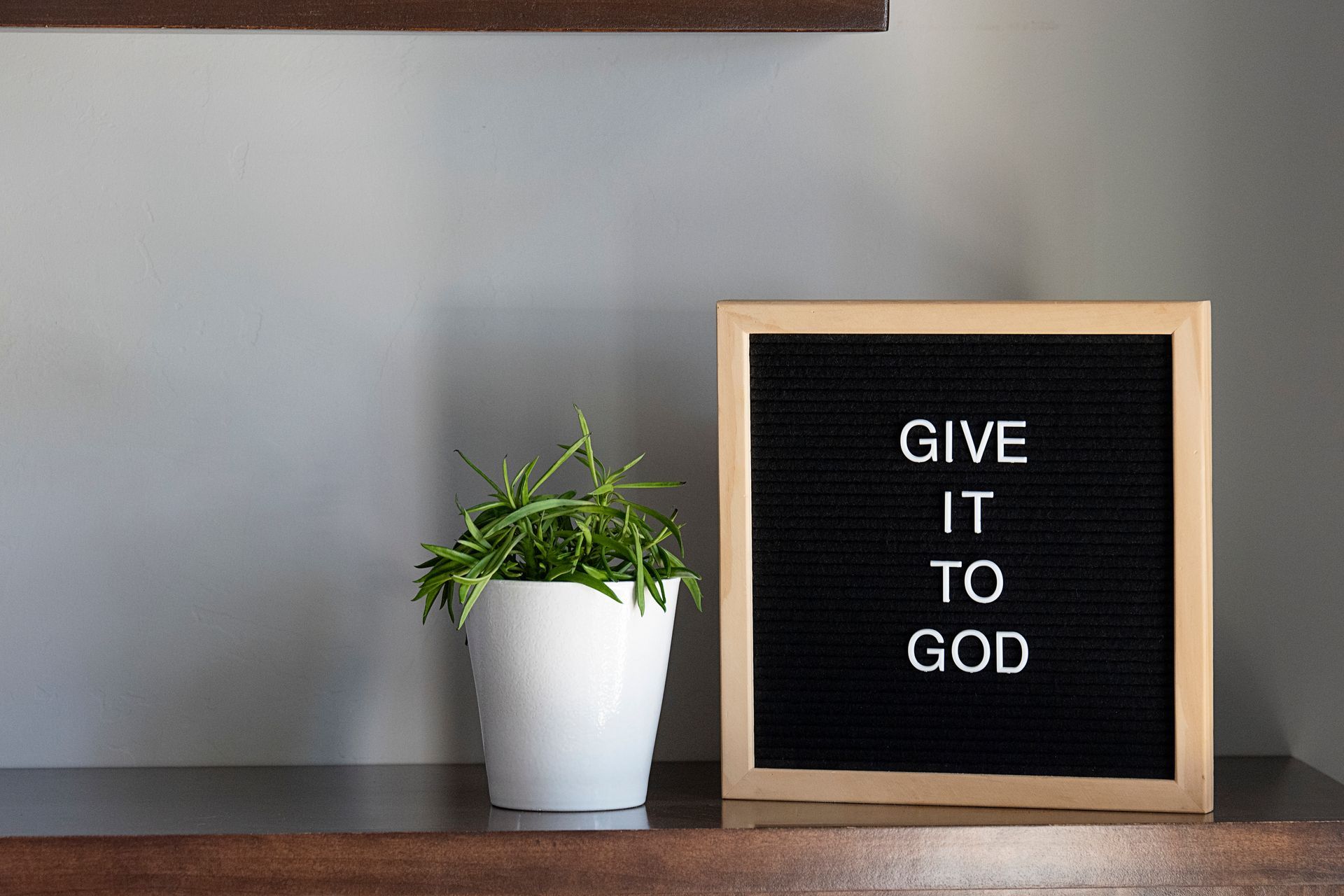How to Truly Give It to God and Let It Go for Good
Affiliate Disclaimer: This blog post may contain product affiliate links. I may receive a commission at no extra cost if you make a purchase after clicking on one of these links.
It’s not easy to let go, is it? We hold onto pain, stress, and control as if gripping tighter will somehow fix everything. But when life feels overwhelming, there’s a better way. Choosing to give it to God isn’t about giving up—it’s about trusting Him with what we can’t handle on our own. It changes everything. In this post, we’ll talk about what it really means to let go and let God take over, and how doing so can bring peace to your mind, heart, and soul. Let’s take one step closer to freedom together.

Understanding What It Means to ‘Give It to God’
When people say “give it to God,” it can sound a little vague at first, right? I used to wonder what that even meant in a practical sense. Does it mean I stop caring? Do I just ignore my problems and wait for everything to magically fix itself? Not exactly. Giving it to God is about surrendering control—letting go of the grip you have on life’s challenges and trusting that God can handle it far better than we can. It’s not passive; it’s faith in action. Let’s break it down further.
Letting Go of Control and Trusting in God’s Plan
If I’m honest, letting go of control has never come naturally to me. I like having a plan, knowing what’s next, and mapping out every step. But life can laugh in your face, can’t it? No matter how hard we try to steer the wheel, we hit detours, dead ends, and unexpected turns. That’s where trusting in God’s plan comes into play.
Surrender doesn’t mean sitting back and doing nothing. It means acknowledging that God’s wisdom is greater than our own. Think about it—He sees the whole picture when we’re only looking at a tiny piece. Trusting Him means believing that His timing is perfect, even when it feels like we’re stuck or things aren’t moving fast enough.
Here’s the thing: trying to control everything is exhausting, and let’s face it, we’re not always as in control as we think. Maybe it’s time we handed the keys over to Someone who actually knows the road ahead.
Why Holding On Can Be Harmful
When we refuse to let go, we’re not just holding onto situations—we’re holding onto stress, fear, and anxiety. It’s like clutching a heavy bag all day. That tension you’re carrying? It shows up in your mind, your body, and even your relationships.
I’ve been there—stressed out, running “what if” scenarios on a loop in my head. It’s draining. And honestly, it didn’t fix anything. Worry doesn’t have the power to change your situation; it only has the power to rob you of peace.
Holding on to past hurts? That’s like picking at a wound that needs time to heal. Letting go doesn’t mean pretending it didn’t happen; it means giving it to God so He can help you heal. When we cling too tightly to our own plans, fears, or pain, it creates a wall. That wall can block the peace and joy God wants to give us.
Here’s a tough truth: sometimes, holding on becomes a form of pride. It’s as if we’re saying, “I’ve got this. I don’t need help.” But deep down, we do. Letting go isn’t weakness; it’s admitting we need God to step in.
Biblical Foundation for Giving It to God
Letting go and trusting God isn’t just a hopeful idea—it’s rooted in Scripture. The Bible is packed with reminders that God asks us to hand over our worries and burdens to Him. One verse that always speaks to me is 1 Peter 5:7: “Cast all your anxiety on Him because He cares for you.” It’s such a simple command, but how often do we actually do it? Too often, I find myself casting my worries on Him, then metaphorically fishing them back out again.
Another powerful verse is from Proverbs 3:5-6, where it says: “Trust in the Lord with all your heart and lean not on your own understanding; in all your ways submit to Him, and He will make your paths straight.” It’s a reminder that our understanding has limits, but God’s doesn’t.
And let’s not forget Matthew 11:28-30, where Jesus says: “Come to me, all you who are weary and burdened, and I will give you rest.” Rest—what a gift, right? Rest doesn’t come from striving harder; it comes from surrendering to Him.
These verses make one thing clear: God doesn’t expect us to figure it all out on our own. He’s ready and waiting to carry our burdens if we’ll let Him. It’s not about giving up—it’s about giving it to Him.
Steps to Give It to God and Let It Go
Giving it to God and truly letting go can feel like such a personal battle, can’t it? We know it’s the right thing to do, but in practice, it’s easier said than done. Life throws curveballs—some that sting, others that nearly knock us off our feet. And if you’re anything like me, you’ve probably tried every possible way to fix, control, or overthink your way out of life’s struggles. But here’s the truth: real peace starts when we release what we can’t handle and trust God to step in. Let’s break down exactly how to do that.
Identifying the Burden or Struggle
Before you can give something to God, you’ve got to know what it is you’re holding onto. Sometimes it’s obvious—grief, anxiety, anger—but other times, it’s hidden under layers of denial or busyness. Are there things in your life keeping you up at night? That nagging thought that just won’t go away?
For me, it’s often a mix. Maybe it’s resentment I’ve been carrying, replaying past arguments like a broken record. Or it’s worry about the future, trying to plan for every possible outcome. Sound familiar? These are my “hold tight” moments, and maybe they’re yours too. Take a moment to pause and ask yourself: What’s weighing on my heart right now? Naming it is the first step toward letting it go.
If you’re struggling to pinpoint it, grab a notebook or sit quietly in prayer. Write it out, say it aloud, and be honest with yourself. Maybe it’s fear. Maybe it’s a relationship. Maybe it’s a situation that no matter how hard you try, keeps slipping out of your control. Identifying the burden gives clarity, and clarity paves the way for surrender.
Practicing Prayer as a Form of Release
Once you’ve identified what you’re holding onto, don’t keep it bottled up. Prayer is where the real work of surrender begins. But let me say this—it doesn’t have to be perfect. God isn’t interested in polished words or rehearsed speeches. He just wants to hear your heart.
When I’m overwhelmed, my prayers are often simple: “Lord, I can’t do this anymore. I need You.” Just saying it feels like handing over a weight I’ve carried too long. Prayer isn’t just a routine; it’s your chance to lay it all out. Whether through tears, whispers, or shouts, releasing your burdens this way invites God to take control.
Here’s something that helps me: visualize placing the burden in God’s hands. Close your eyes and picture it. That anxiety? Give it to Him. That unresolved pain? Hand it over. Imagine God taking it from you, replacing the heavy load with His peace. Prayer is less about how you do it and more about trusting that He’s listening, even when you’re unsure what to say.
Trusting God Through Faith
This is where things can get tough. Even after praying, those lingering doubts or “what ifs” can creep back in, can’t they? Trusting God means believing He’s got it—even when there’s no immediate solution. Faith isn’t about knowing all the answers; it’s about trusting the One who does.
Faith reminds me of stepping onto a bridge in the fog. You can’t see the other side, but you trust the bridge will hold you. That’s what trusting God looks like. It’s choosing to believe He’ll guide your steps, even when you can’t see where the path leads.
When I handed over my biggest worries to God, it didn’t always feel instant, but it brought something priceless: peace. Not the kind of peace that says everything’s perfect, but the kind that says, “I don’t have to figure this out alone.” Trusting God isn’t passive; it’s an active decision to release control every single day.
Using Gratitude to Reinforce Letting Go
Want to know one of the best ways to let go and keep moving forward? Gratitude. It shifts your focus from what’s wrong to what’s right. When I get stuck dwelling on struggles, I force myself to stop and thank God for His blessings—big or small.
Here’s what this might look like:
- Thank Him for the breath in your lungs and the strength to face another day.
- Acknowledge the ways He’s already worked in your life.
- Remember times when He showed up before, even when you didn’t expect it.
Gratitude has a way of realigning your heart. It’s like cleaning the windows of your soul, letting you see the light of God’s goodness even in the middle of struggles. Gratitude doesn’t erase the challenges but helps you focus on who God is, not just what you’re walking through.
Avoiding the Temptation to Take Back Control
If we’re honest, giving it to God and letting it go can feel like a tug of war. One moment we’re surrendering, the next we’re yanking it back. Why do we do that? Maybe it’s fear or doubt. Or maybe it’s that sneaky part of us that believes no one can handle it better than we can.
When you feel that pull—when you’re tempted to take back what you’ve just given to God—pause and remind yourself why you’re surrendering. For me, it’s often a simple reminder that clinging to control didn’t work before, and it won’t work now.
Here’s the thing: surrender isn’t a one-time deal. It’s a choice we make over and over again. Some days, giving something to God feels easy. Other days, it feels like I’m re-surrendering that same burden for the hundredth time. And that’s okay. Each time you let it go, you grow stronger in your faith and more confident in His ability to take care of it.
So when those struggles creep back in—and they will—don’t beat yourself up. Instead, go back to Step One. Pray. Trust. Release. And remember, God’s got this. Even when you don’t.
The Role of Scripture in Letting Go
Letting go can feel impossible when life throws challenges that weigh heavy on your heart. But here’s the thing: scripture offers a foundation to lean on when the world feels overwhelming. It reminds us that we’re never alone in our struggles and that God’s guidance is available every step of the way. When we build our faith on His Word, it strengthens our ability to surrender control and fully trust in His plan.
Key Verses for Encouragement and Guidance
The Bible is full of verses that speak directly to the act of surrender and trusting God. These scriptures aren’t just words on a page; they are promises that meet us in our doubts, fears, and struggles.
Here are a few of my go-to verses that have helped me let go when life felt like too much:
- Matthew 6:34: “Therefore do not worry about tomorrow, for tomorrow will worry about itself. Each day has enough trouble of its own.”
This verse stops me in my tracks when my mind spirals into endless “what-ifs.” It’s a reminder to stay present. God is already in tomorrow, so why am I borrowing stress from a day that hasn’t even happened yet? - Philippians 4:6-7: “Do not be anxious about anything, but in every situation, by prayer and petition, with thanksgiving, present your requests to God. And the peace of God, which transcends all understanding, will guard your hearts and your minds in Christ Jesus.”
This one hits home for me every single time. It’s easier said than done, right? But something happens when I stop trying to figure everything out on my own and just lay it all before Him. That peace? It feels like a deep breath after holding it for way too long. - Isaiah 41:10: “So do not fear, for I am with you; do not be dismayed, for I am your God. I will strengthen you and help you; I will uphold you with my righteous right hand.”
This verse reminds me who my true source of strength is. When I feel like I can’t hold it together for one more moment, God is there, offering not just strength but a steady hand to lean on. - Psalm 55:22: “Cast your burden on the Lord, and He will sustain you; He will never permit the righteous to be moved.”
Picture handing over your heaviest bag to someone stronger. That’s what God asks us to do here. Let Him carry what’s breaking you down, and trust that He won’t let you fall.
These verses don’t ignore the fact that life is hard. They acknowledge our struggles but point us to a God who is bigger and more capable than any burden we carry.
Incorporating Scripture Into Daily Life
It’s one thing to read these verses, but how do we actually let them sink in and guide us each day? For me, it’s all about making scripture a regular part of my routine. The more I meditate on God’s Word, the easier it becomes to trust Him fully.
Here are a few simple ways I incorporate scripture into my daily life:
- Start your day with a verse or affirmation
There’s power in starting your morning by anchoring yourself in God’s promises. Write down a verse that resonates with you—like one of the ones I mentioned earlier—and keep it somewhere you’ll see it. I keep mine on a sticky note on my bathroom mirror. It sets the tone for my day and reminds me to let go of worries before they even begin. - Use scripture as a prayer guide
Feel stuck in your prayer life? Use a Bible verse as your starting point. For example, you can pray through Philippians 4:6-7, saying, “Lord, help me to bring my worries to You with a thankful heart. Guard my mind with Your peace.” Scripture becomes more personal when you weave it into your conversations with God. - Make it visual
Create reminders of God’s Word throughout your day. Whether it’s setting a verse as the background on your phone or using an app that sends you daily scriptures, visual cues help keep your focus on Him. - Turn scripture into affirmations
Instead of just reading a verse, reframe it as something you declare over your life. For example, take Isaiah 41:10 and say, “I will not fear because God is with me. He strengthens me and upholds me.” This simple act shifts your mindset and reinforces the truth that God has you covered. - Journal what you’re learning
Sometimes I’ll take a verse and write down what it’s teaching me or how it speaks to what I’m going through. Journaling helps me internalize scripture rather than just skimming over it. It also becomes a record of God’s faithfulness that I can look back on.
Making scripture part of your daily rhythm is like filling your cup with living water. The more you soak it in, the less room there is for anxiety, fear, or doubt. When you anchor your life in God’s Word, you don’t just “give it to God” once and hope for the best. You keep coming back to Him, day after day, drawing strength from His promises.
Even on the hard days, His Word reminds us He’s in control, and we don’t have to be. Isn’t it comforting to know we can let go because God’s got it?
The Emotional and Spiritual Benefits of Letting Go
When life feels like it’s spiraling out of control, it’s easy to grip tighter—to try and manage everything on your own. But the truth is, the harder you hold on, the heavier the load feels. Letting go isn't about giving up; it's about trusting God with the weight you were never meant to carry. When we release our struggles to Him, something amazing happens—not just on the surface, but deep within our hearts and souls. Let's unpack how letting go impacts us emotionally and spiritually.
Finding Inner Peace Through God
Stress and anxiety have this sneaky way of creeping in when we try to carry life’s burdens all by ourselves. It’s like holding an overfilled grocery bag—eventually, the handles cut into your hands, and you’re left wondering why you didn’t just ask for help. That’s where surrender changes everything.
When you give your worries to God, you’re not ignoring them; you’re placing them into the hands of Someone more capable. God’s peace doesn’t just skim the surface—it seeps into every corner of your being. Imagine the feeling of dropping off a backpack after a long hike. That relief? That’s what happens when we stop striving and start trusting.
Letting go of what we can’t control isn’t just practical; it’s biblical. Philippians 4:7 promises us peace that “surpasses all understanding.” That kind of peace doesn’t depend on circumstances; it comes from knowing God’s got it all figured out. The more we trust Him, the quieter the noise in our minds becomes. And honestly, isn’t that what we’re all craving—a little quiet, a little rest?
Strengthening Your Relationship with God
Let’s be real: when we hold tight to our problems, it’s easy to grow distant from God. It’s like keeping a friend at arm’s length while insisting, “I can handle this myself.” But when we willingly let go, we’re saying, “God, I trust You more than I trust myself.” That kind of trust deepens the relationship in ways nothing else can.
Think of surrender as a bridge. When you let go and give it to God, you’re building a stronger connection. You start to lean on Him, not just in big moments, but in the day-to-day stuff too. And the beauty of it? God never gets tired of being your strength.
The relationship isn’t one-sided either. Through surrender, you get to experience God’s faithfulness in real, tangible ways. Maybe He answers a prayer in a way you didn’t expect or opens a door you couldn’t budge on your own. Each time, your faith grows a little more, and so does your reliance on Him. It’s in these moments that you realize surrender isn’t about losing control—it’s about handing the reins to the One who loves you more than you can imagine.
Experiencing Personal Growth and Freedom
Here’s the thing: holding on can feel safe, but in reality, it’s like building a cage around yourself. Fear keeps you locked in. Worry piles up like bricks. And control? It’s the biggest lock of all. Letting go isn’t just about trusting God—it’s about setting yourself free.
When you finally give your struggle to God, you’re making room for His healing and growth. It’s like tending to a garden. If you hold onto weeds (like fear, guilt, or shame), they choke out everything good. But when you pull those weeds and hand them over to Him, new things can grow—like joy, resilience, and contentment.
Freedom isn’t just a buzzword here. It’s what happens when you stop clinging to what’s breaking you and allow God to fill that space with His grace and love. You realize you don’t have to solve every problem or carry every weight. That’s not your job; it’s His.
And here’s the kicker—growth happens in the letting go. You become someone who doesn’t just survive hard times but thrives through them because your trust is rooted in God, not in your own strength. That’s the kind of freedom I want to walk in every single day. Don’t you?
Common Challenges in Letting Go
Letting go sounds simple enough, but we both know it’s anything but. If it were easy, we wouldn’t wrestle with it so much, would we? Whether it’s fear, doubt, or those nagging thoughts that won’t let up, surrendering to God can feel like climbing a mountain without a map. The truth is, these struggles are normal, but they don’t have to hold us back. Let’s break down some common hurdles and how to overcome them.
Fear of Losing Control
If I’m being honest, I like control. It feels safe, doesn’t it? When we’re in control, we convince ourselves everything will go according to our plan. But when life shifts—relationships break, unexpected storms roll in—that false sense of security crumbles, leaving fear in its place.
Letting go is hard because it means stepping into the unknown. And let’s face it: uncertainty is uncomfortable. You might wonder, What happens if I give this to God? What if things don’t turn out the way I want? These questions are rooted in fear. But here’s the thing: holding on tightly doesn’t actually give us control; it just wears us out.
Here’s a way to think about it: Imagine trying to hold water in your hands. The tighter you squeeze, the faster it slips through your fingers, right? That’s what control is like—an illusion. God isn’t asking us to trust blindly; He’s asking us to trust Him because He sees the full picture when we only see a corner.
If fear of letting go feels overwhelming, start small. Pray something simple like, “God, I don’t know how this will work out, but I trust You to guide me.” Trust isn’t built overnight, but each step of surrender strengthens it.
Doubting God’s Plan
Let’s be real—trusting God’s plan can feel like a leap of faith, especially when life doesn’t make sense. Maybe your dreams didn’t unfold like you hoped, or you’ve faced heartbreak that left you shattered. It’s easy to wonder, Does God even care? Why isn’t He fixing this the way I want?
Doubt sneaks in when we measure God’s faithfulness by our circumstances. But God’s plan isn’t always about giving us what we think we need; it’s about working things together for His greater purpose (Romans 8:28). That can be hard to swallow when you’re in the middle of the mess, I know.
When I’ve struggled with doubt, I’ve had to remind myself of times when God showed up in ways I didn’t expect. Those moments when what seemed like a setback turned out to be a setup for something better. Reflecting on those experiences reminds me that God isn’t distant—He’s weaving something beautiful, even when I only see the frayed edges.
Rebuilding trust takes time. If you’re struggling with doubt, be honest with God about it. He’s not looking for perfect faith—He’s looking for the kind that keeps coming back to Him, even with questions.
Dealing With Recurring Doubts and Worries
Let’s talk about those thoughts that just won’t quit. You know the ones—“What if this happens?” or “What if that goes wrong?” It’s like playing a broken record, isn’t it? Even after you’ve prayed and tried to surrender, the worry creeps back in, and suddenly you’re carrying the weight all over again.
This cycle can feel defeating, but it doesn’t mean you failed at giving it to God. Letting go isn’t always a one-time thing; sometimes, it’s a daily practice. Think of it like peeling layers off an onion—each layer you surrender brings you closer to true freedom, but it takes time.
When I catch myself spiraling with recurring worries, I pause and ask, Have I prayed about this as much as I’ve worried about it? Most of the time, the answer is no. So I stop, take a deep breath, and hand it back to God again.
Here are a few strategies that help me manage recurring doubts:
- Redirect your thoughts. When a worry pops up, replace it with truth from Scripture. For example, remind yourself of Philippians 4:6-7: “Do not be anxious about anything…” Say it out loud if you need to.
- Write it down. Journaling your fears and surrendering them to God on paper can be incredibly freeing. It’s like drawing a line in the sand, saying, This is Yours now, Lord.
- Use visual reminders. I keep a small stone on my desk as a symbol of handing over my burdens. When doubts creep in, I physically hold it and say, This isn’t mine to carry.
Surrendering doesn’t mean you won’t have to do it again tomorrow or the day after. But each time you choose to release those worries, you’re choosing faith over fear. And that’s a step worth celebrating.
How to Maintain a Lifestyle of Trust and Surrender
Letting go and giving it to God isn’t something you do just once—it’s something you live every day. It’s a practice, a rhythm, and honestly, some days it’s easier than others. But if we want to make this a way of life, there are habits and tools that can help. Think of them like roots that keep you grounded when life’s storms roll in. Let’s explore how daily prayer, supportive relationships, and even something as simple as journaling can anchor us in trust and surrender.
The Power of Daily Prayer and Meditation
If I’ve learned one thing about maintaining trust in God, it’s this: prayer is where the magic happens. And I’m not talking about a quick, half-hearted “thanks for the day” before bed. I’m talking about moments where you really sit still, breathe deeply, and pour out your heart.
Why? Because prayer connects us to God like nothing else can. It’s not just us talking; it’s an opportunity to listen. When I make space to truly pray, it’s like unloading a heavy backpack I’ve been carrying for way too long. And meditation? That’s like sitting in the quiet afterward and just letting God’s peace wash over me.
Here’s what I’ve noticed: when I skip a day—or several—I feel it. The stress creeps back in, the doubts get louder, and I start leaning on my own strength again (which, spoiler alert, never works). But when I pray daily, it resets my perspective. I let go of what’s not mine to carry and remember who’s really in control.
If you want to make this a habit, start small. Here’s what’s worked for me:
- Set a specific time: Whether it’s in the morning with coffee or at night before bed, find a time that works for you and stick to it.
- Use guided prayers if you’re unsure where to start: Books or apps can help if words don’t come easily.
- Combine it with meditation: After you pray, sit for a few minutes in silence. Focus on things like a Bible verse or just the rhythm of your breathing. Let God’s presence settle you.
No one’s perfect at this—I’m definitely not—but even five or ten minutes a day can make a world of difference.
Surrounding Yourself With a Supportive Community
Have you ever tried to carry something heavy on your own, only to realize it’s way easier with some help? Trust and surrender work the same way. You’re not meant to do this solo. We need people around us who point us back to God when we start slipping into doubt.
For me, being part of a church or small faith group has been a lifeline. It’s not just about sitting in a pew or joining a Bible study; it’s about doing life with people who get it. They pray for you, encourage you, and remind you of God’s promises when your faith starts to wobble.
Here’s the thing: it’s easy to isolate when life gets tough. But isolation only makes surrender harder. When I’m in a supportive community, I’m constantly reminded that I’m not alone—not in my struggles, and definitely not in my faith.
If you’re looking to build this kind of support system, here are some ideas:
- Find a local church or online community: Look for a place that feels welcoming and centered on God’s Word.
- Join a small group: Many churches offer groups focused on specific life stages or topics, and it’s a great way to connect deeper.
- Be vulnerable: Sometimes we wait for others to reach out, but don’t be afraid to take the first step. Share your struggles—you’d be surprised how many people are walking the same road.
There’s something powerful about hearing someone say, “I’ll pray for you,” or even better, “Let’s pray together right now.” Community turns faith into something tangible, and it helps you keep surrendering to God, even when it feels impossible.
Journaling as a Tool for Reflection and Surrender
I’ll admit it—I wasn’t always a journal person. I used to think, “Isn’t that just writing down my thoughts?” But let me tell you, journaling has been a game-changer in my spiritual life. When my mind feels like a tangled ball of yarn, writing things out brings clarity.
Think of journaling like having a conversation with God on paper. It’s a space to be honest—no filters, no pretending. When I jot down my struggles, worries, or even the things I’ve been trying to control, I feel like I’m physically giving them to God. It’s like saying, “Here, Lord, this is Yours now.”
Here’s how I use journaling to anchor my trust and surrender:
- Start with gratitude: I write down three things I’m thankful for, even on the hard days. Gratitude shifts my focus back to God’s goodness.
- Be specific about struggles: I name what’s weighing on me. Whether it’s a fear, a decision, or a relationship, putting it into words makes it easier to let go.
- Write prayers: Sometimes, I’ll write out an entire prayer. It helps me focus and keeps me from rushing through the process.
- Document God’s faithfulness: Whenever I see a prayer answered or feel God’s peace in a situation, I write it down. Looking back at these moments reminds me why I can keep trusting Him.
You don’t need a fancy journal or hours of free time. Just grab a notebook and start. Some days you’ll fill pages. Other days, you’ll write a single sentence. Both are okay. What matters is the act of turning to God and handing over whatever’s on your heart.
Building a lifestyle of trust and surrender takes practice, but these habits—prayer, community, and journaling—make it doable. They’re like anchors that keep us steady when life feels overwhelming. And if you’re wondering where to start, just pick one. God will meet you there, wherever that is.
Conclusion
Letting go and choosing to give it to God is a daily decision—a decision to release the weight of control, fear, or anxiety and trust Him instead. It’s not always simple, but the peace that follows is worth every ounce of faith it takes.
When we surrender, we’re not giving up; we’re making room for God to step in and do what only He can. This act of trust not only lightens our burdens but also strengthens our relationship with Him, reminding us that we don’t have to carry it all alone.
Take the steps shared here: identify what’s holding you back, bring it to God in prayer, and remind yourself of His promises through Scripture. Let today be the day you stop striving and start resting in the truth that He’s got this.
What burden do you need to hand over right now? Start small, but start—and watch how God brings peace where there used to be pressure.
Get Inspired: Subscribe for Encouragement and Exclusive Content









